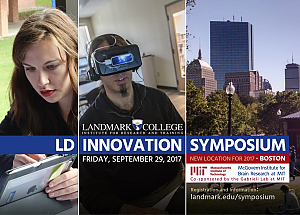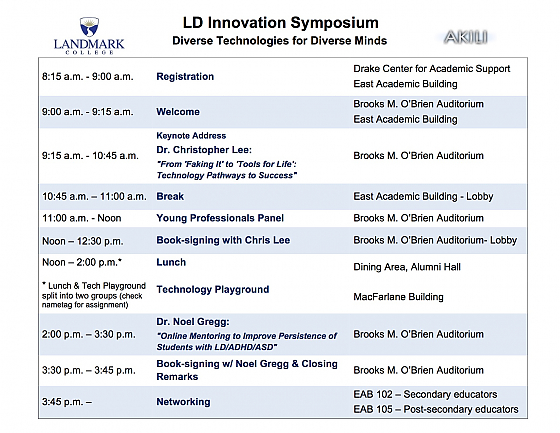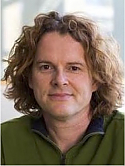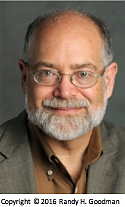Here are the highlights from past LD Innovation Symposia.
Highlights of Previous Symposia
5th annual LD Innovation Symposium was held September 29, 2017 in Cambridge, MA.

Keynote by Eric Tridas, M.D., FAAP
"ADHD and Learning: A Perfect Storm"
Medical Director of the Tridas Center for Child Development
President of Developmental and Behavioral Pediatrics Consultants, Inc.
Author of From ABC to ADHD: What Every Parent Should Know About Dyslexia
ADHD is one of the most common developmental disorders that impacts students of all ages. It affects all aspects of the student’s life, including their work, behavior/emotional regulation, social relationships and health. Oftentimes, ADHD is accompanied by other emotional and developmental problems. The American Academy of Pediatrics’ guidelines for the diagnosis and management of ADHD recommend that we also evaluate for the presence of other commonly occurring problems in the areas of learning and behavior. During his presentation, Dr. Tridas will discuss a practical, easy to understand model for evaluating and managing learning and behavior problems. The participants will learn a structured way of describing the student’s strengths and weaknesses in the areas of learning, behavior, social relationships, and health. Presenting an organized description of how these factors impact the student’s life can guide the formulation of a comprehensive and successful intervention plan encompassing educational, psychological, medical, and environmental recommendations.
Plenary Presentation by John Gabrieli, Ph.D.
Cognitive Neuroscience & Dyslexia: From Biology to Remediation
Grover Hermann Professor in Health Sciences and Technology and Cognitive Neuroscience, MIT
Professor of Brain & Cognitive Sciences, MIT
Investigator, McGovern Institute for Brain Research, MIT
Director, Athinoula A. Martinos Imaging Center, MIT
I will review what is now known about differences in brain structure (anatomy) and function (physiology) with reading difficulty (dyslexia). I will also review how effective remediation can result in brain plasticity associated with gains in reading. Finally, I will share thoughts about how basic research about dyslexia might contribute to the practical education needs of students with learning differences.
Breakout Sessions:
Session I.
a. Summer Slide, Glide, or Gain: Struggling Reader Outcomes in a High-stakes Season (Christodoulou)
b. Applying Universal Design Practices in Economics Coures (Banerjee, Dahlstrom-Hakki, Koskoris)
c. “Passage to Hunza”: Developing Hands-on Educational VR Games to Teach Statistics (Landmark College Students)
d. Engaging Faculty and Staff in Students' Success (Strage and Tu)
Sessions II.
a. Dyslexia Interventions: What Do You Do When All Else Fails? (Schneps)
b. We Know More than We Can Tell: How Game-based Learning Assessments Help Students Demonstrate their Knowledge (Altman, Dahlstrom-Hakki)
c. New and Engaging Medium: How Diverse Student Talent Can Be Brought into VR (Landmark College Students)
d. Environmental Influences on The Neural Basis of Language and Reading Development (Romeo)
Thanks to all who attended on Friday, September 30, 2016.
Keynote by Dr. Jan Plass, Chair in Digital Media and Learning Sciences at NYU
"Adaptivity and Personalization for Learning"
Adaptivity and Personalization for learning are highly popular notions, for academics and ed tech vendors alike, yet the concepts themselves are poorly defined, and the science of learning behind them is often under-defined or completely lacking. In this talk I will first distinguish among customization, personalization, and adaptivity. I will then propose a taxonomy for adaptivity that will allow for a more systematic discourse about this important topic and more effective evaluation of educational environments that claim to be adaptive. I will illustrate the use of this taxonomy on examples involving adaptivity based on cognitive, emotional, motivational, and socio-cultural variables.
Watch a video of Dr. Plass describing his work and how it looks to enhance learning for students.
Special Guest Presentation by Dr. Roger Tucker, Founder, Sonocent Software
"Harnessing the Power of Spoken Language for UDL using Sonocent Software"
Written text can be a huge barrier to learning for so many students, but it is not a necessary one. Sonocent make software which enables students to effectively learn and express themselves using spoken language. From note taking to writing assignments, Sonocent software breaks complex writing tasks into manageable steps, scaffolding many study processes and removing the need for writing entirely for some people. The software enables users to work with images, text and audio in a simple interface, enabling students to combine information from almost all sources in one place. It is currently being used by over 100,000 students across hundreds of institutions, some of whom see their average GPAs rise by as many as 3 points when using the software.This presentation will explain why and how we should be harnessing the power of spoken language to help students study independently and reach their potential, demonstrating how students use Sonocent for note taking and other study skills.
Special Guest Presentation by Dr. Matthew Schneps, Director, Laboratory for Visual Learning
"Rethinking the Technologies We Use for Reading"
Whether we read using a computer, a cell phone, or on a sheet of parchment penned by a quill, reading necessarily invokes use of a technology. While people differ in their abilities to read, how much of this is simply a consequence of the technology itself? New research suggests that reading is fundamentally limited by some basic design choices made in formulating the technology of reading, and that through judicious reconceptualization of such technology people --including those regarded as reading impaired-- can substantially improve their capacity for reading. In this session we will review the emerging literature in this field and consider new perspectives on reading disability implied by these links to technology. The session will offer practical suggestions practitioners can immediately take away and apply to make reading more efficient and inclusive.
We will use an Apple/Android smartphone app called Voice Dream Reader to illustrate some of the ideas presented, and participants may enjoy having this on their device during the presentation to follow along more closely.
Technology Playground
The Tech Playground is an interactive, audience participation segment of the LD Symposium. It is set up like a technology fair, with individual presenters at tables demonstrating technology or apps they use. Our focus is on technology that supports personal or professional productivity. In the past we've highlighted wellness apps, apps for facilitating conversations for individuals on the autism spectrum, note-taking tools, and many others.
Schedule at a Glance
(Click to enlarge)
Friday, October 2, 2015
9 a.m. to 4 p.m.
Thank you to all those who attended our third annual day-long symposium on new and emerging technologies for people who learn differently.
Here are some of the highlights from 2015.
Keynote by Christopher Lee
"From 'Faking It' to 'Tools for Life': Technology Pathways to Success"
Join Christopher as he shares his journey through life’s challenges, and discover how his technology pathways to success led to nationwide systemic change in higher education for individuals with disabilities and the people who serve them. Learn about Christopher’s social entrepreneurship venture, incubating and growing an organization which strives to improve the human condition for individuals with disabilities through equal access to technology-based and research-driven information, services, and products. Share Christopher’s excitement about new technology tools ranging from accessible engineered content, to robotics and wearable technology.
Christopher Lee, Ph.D. is the Director of AMAC Accessibility Solutions and Research Center. He is the author of What About Me? Strategies for Teaching Misunderstood Learners and Faking It: A Look Into the Mind of a Creative Learner.
Dr. Lee is a renowned speaker, author, researcher, and advocate in the field of learning disability. His work focuses on innovative methods, including the use of adaptive technology, for improving, promoting, and ensuring accessibility for individuals with disabilities. He has secured millions of dollars in support of these efforts and his work has been featured on the likes of CNN, National Public Radio, and in the Associated Press.
Special guest speaker Noel Gregg
"Online Mentoring to Improve Persistence of Students with LD/ADHD/ASD"
Noel Gregg will explore virtual mentoring as a support service for improving the persistence of secondary and postsecondary students with LD, ADHD, and ASD engaging in STEM coursework. Three aspects of virtual mentoring will be examined: (1) factors associated with how students with LD, ADHD, and ASD use social media tools, including virtual platforms, (2) factors contributing to the development of mentee/mentor relationships, and (3) factors which affect a mentee’s increased persistence in STEM.
Noel Gregg, Ph.D. is a Distinguished Research Professor at the University of Georgia in the Institute for Interdisciplinary Research and Associate Dean of Research. She is PI of the NSF Georgia STEM Access Alliance, a virtual learning model for increasing STEM persistence. Dr Gregg is the author of Adolescents and Adults with Learning Disabilities and ADHD: Assessment and Accommodation and Written Expression Disorders
Speaker books can be pre-ordered from the College Bookstore. A limited number will be also available for purchase on campus during the event.
Speaker presentations have graciously been sponsored by:
Full Symposium Agenda

FAQs
Who should attend?
Are you an educator, researcher, or administrator working with students with LD, ADHD, or ASD? Are you interested in how technology can improve teaching and learning? Do you hope to use technology more strategically in the classroom? If you answered yes to any of these questions, the LD Innovation Symposium is right for you!
What should I expect from the "Young Professionals Panel"?
You'll hear from young professionals in the work force about what kinds of technology they use in daily life at work and for personal productivity and enrichment. They will share tools they use currently, how they learned to use them, and advice for others starting out in the work force, or supporting students in transition from school to work.
What is the "Tech Playground"?
The Tech Playground is an inter-active, audience participation segment of the LD Symposium. It is set up like a technology fair, with individual presenters at tables demonstrating technology or apps they use. Our focus is on technology that supports personal or professional productivity. In the past we've highlighted wellness apps, apps for facilitating conversations for individuals on the Autism spectrum, note-taking tools, and many others.


_600_412shar-80.jpg)


_250_188shar-80.png)